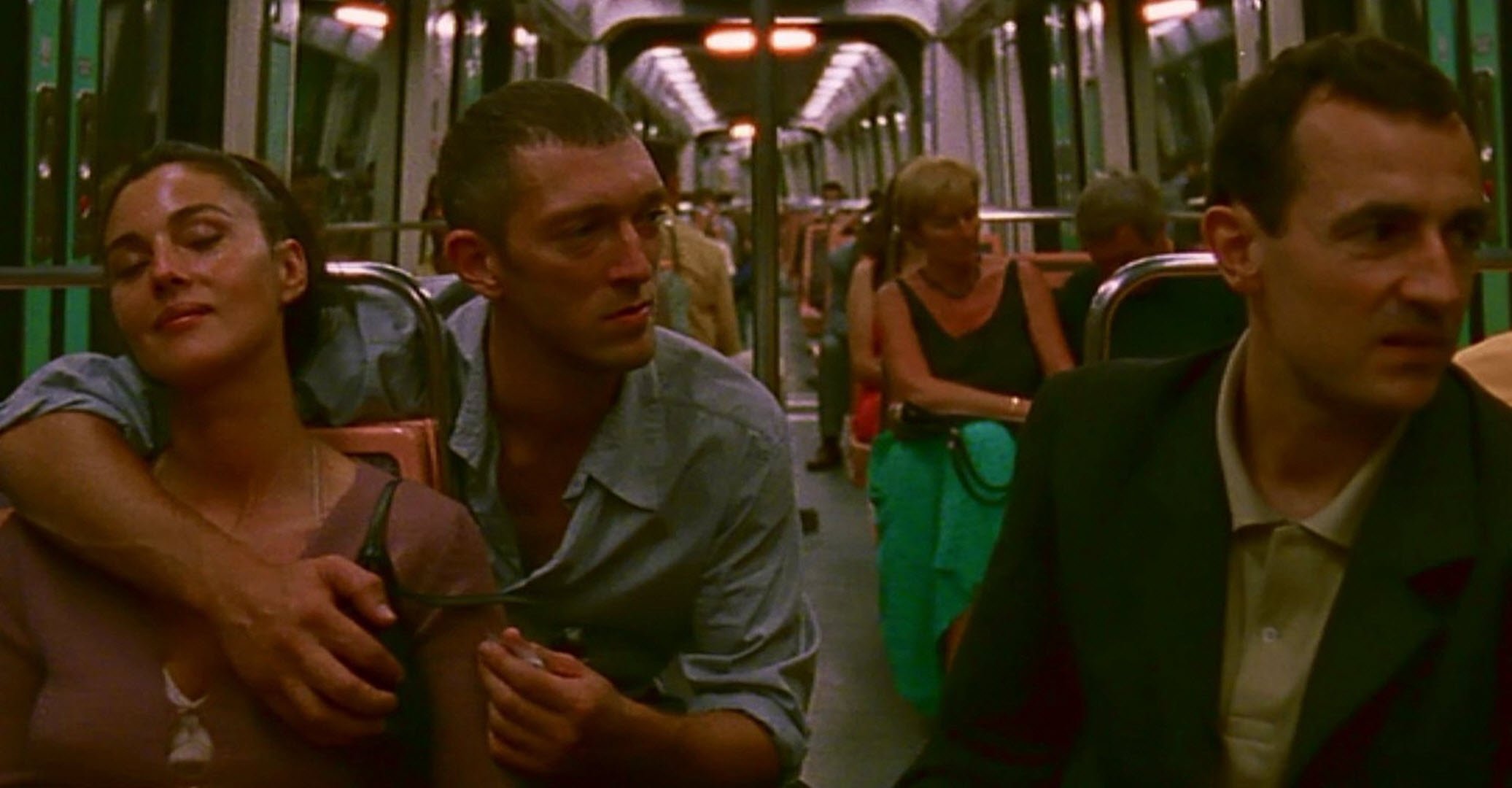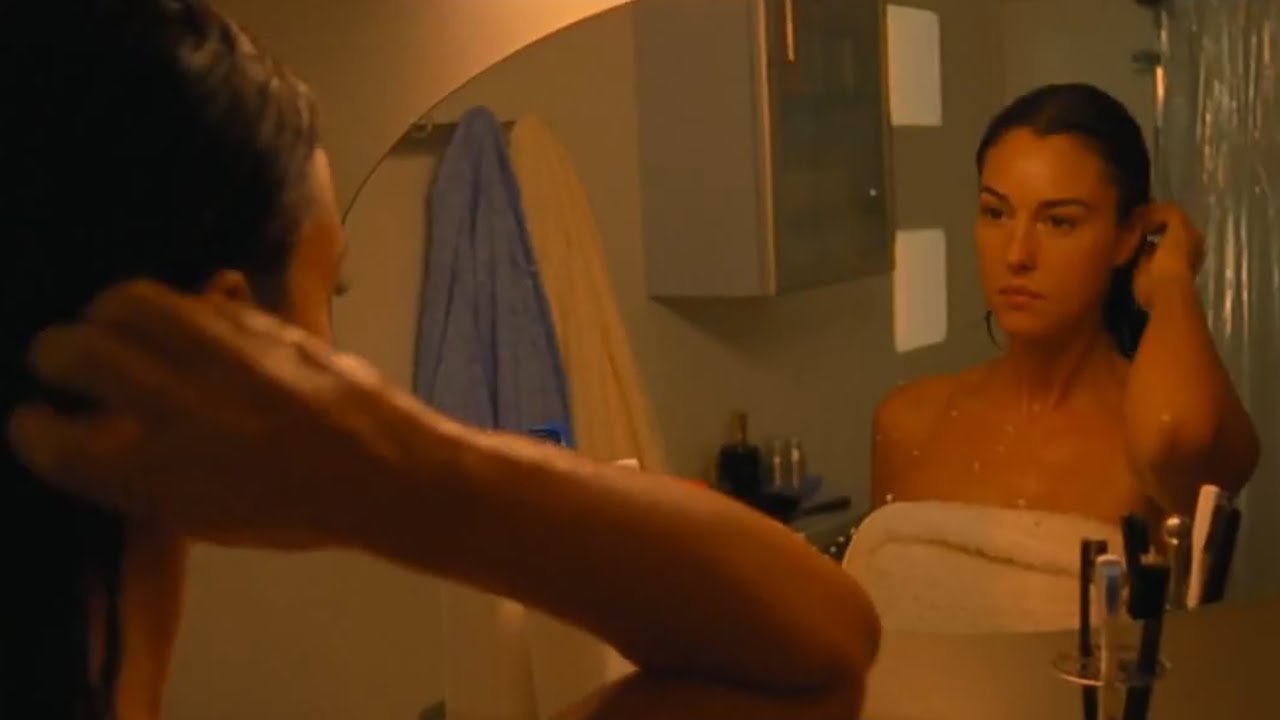[Film Review] Irreversible (2002) (Straight Cut)

Irréversible (2002) is a French extremity film from Gaspar Noé. It follows Alex, Marcus and Pierre over one traumatic fever dream of a night in Paris.
Upon its original release, Irréversible was presented out of chronological order with the film opening at the end of the story and working backwards. This new, straight cut presents the film in sequential order, showing Marcus and Alex meeting with Pierre to attend a party, before seeing the brutal attack on Alex, and then culminating with the final scenes of chaos as Marcus and Pierre carry out their vengeful rampage.

During the time of its first l release, reception of the film was mixed. Some praised the direction and acting, others derided the shocking violence and cruelty that makes up much of the film. This is a brutal film, and the violence of masculinity looms large in every interaction. But, if we see this as a commentary on toxic masculinity, then it is possible to view the events as a damning indictment of male entitlement. The man who attacks Alex is a despicable human stain who thinks he is entitled to take what he wants, forcing women into violent rapes with a knife and his fists. But we also see how this event, and Marcus and Pierre’s subsequent actions, are fuelled by the same male entitlement.
Throughout the film Alex’s suffering is secondary to Marcus and Pierre’s masculine rage. When approached by men who offer help in facilitating their revenge, the event is discussed in terms of how Marcus and Pierre have suffered, how hard it is to imagine “until it happens to you”. Nothing has happened to them, Alex acts as the sacrifice that unleashes their right to revenge. That revenge is the first thing on Marcus’ mind, rather than Alex, shows that this is not about revenge for her pain, but for his own.

Overall, this film highlights the dangers of misogyny and male entitlement, demonstrating how they spread like poison through society. The culmination of events leaves everyone worse than when we found them but the real victim is Alex, who first endures a mooch of a boyfriend, then her ex-boyfriend pawing at her and asking invasive questions about her sex life, then her mooch boyfriend cheating on her, before being viciously attacked and left for dead. Throughout the film she puts men first, placing her pleasure, safety and wellbeing second. It is a sad portrayal and one that reminds us that even when the ‘good woman’ does all the right things, passifies, pleases and placates the men around her, she is still a target for their rage and violence. Alex is a warning to us all, your compliance won’t protect you.
LISTEN TO OUR HORROR PODCAST!
It is interesting to see this new cut and have the opportunity to watch the film play out chronologically. Whilst the assault of the senses remains, with the camera work, colour, and thumping hearts and techno music, it does make the story flow more logically. Whether this is for better or worse would be a matter for personal taste. It is also interesting to see how the film’s narrative has shifted, with Noé originally billing it as a “violent trip from hell to paradise”. Now we are on a violent trip from paradise straight to hell, ending in a blood spattered nightmare. This seems to speak more to the inherent nihilism of the French extremity movement, and coming twenty years after the first film, perhaps reflects the social and cultural hellscape we have been living in in recent times.

It is worth mentioning for those who have never seen the film that it is part of the French Extremity movement and so offers a brutal and nihilistic vision that includes an extreme, prolonged scene of sexual violence, heavy misogyny, homophobia and racism. Not for the faint of heart, but definitely one to seek out if you have an interest in the canon of French cinema that comprises one of the most evocative, provocative and affecting subgenres ever created. Whilst Irréversible won’t leave you with an urge to walk home alone, it will pull you, kicking and screaming, towards an ugly truth about human nature and the inherent dangers of toxic masculinity.























![[Ghouls Podcast] Ghouls Watch: Bucket List of the Dead, Blood Drive, Candy Land & more](https://images.squarespace-cdn.com/content/v1/5fe76a518d20536a3fbd7246/1696261000263-58VQFOVWPE363OFGP7RF/GHOULS+WATCH.jpg)
![[Ghouls Podcast] Tender Is The Flesh with Zoë Rose Smith, Bel Morrigan and Liz Bishop](https://images.squarespace-cdn.com/content/v1/5fe76a518d20536a3fbd7246/1693769261264-MS4TS4Z4QC1N15IXB4FU/Copy+of+%5BJuly%5D+Antiviral%2C+possesoor+and+infinity+pool.jpg)
![[Ghouls Podcast] Antiviral, Possessor & Infinity Pool with Zoë Rose Smith, Amber T and Iona Smith](https://images.squarespace-cdn.com/content/v1/5fe76a518d20536a3fbd7246/1691238787263-XYRKXW2Z7RWI9AY2V2GX/%5BJuly%5D+Antiviral%2C+possesoor+and+infinity+pool+%281%29.jpg)
![[Ghouls Podcast] Ghouls Watch: Body Horror Recommendations](https://images.squarespace-cdn.com/content/v1/5fe76a518d20536a3fbd7246/1691238687847-L9U434I1U4HZ3QMUI3ZP/%5BJuly%5D+Ghouls+Watch+-+Website+%281%29.jpg)
![[Ghouls Podcast] Ghouls Watch: Bones and All, Suitable Flesh, The Human Centipede & more](https://images.squarespace-cdn.com/content/v1/5fe76a518d20536a3fbd7246/1687855203348-7R2KUSNR6TORG2DKR0JF/%5BJune%5D+Ghouls+Watch+-+Website.jpg)
![[Ghouls Podcast] 3 Original vs. Remake Horror Films with Rebecca McCallum & Kim Morrison](https://images.squarespace-cdn.com/content/v1/5fe76a518d20536a3fbd7246/1685286663069-0Q5RTYJRNWJ3XKS8HXLR/%5BJune%5D+Original+vs.+Remake+Horror+Films.png)
![[Ghouls Podcast] Ghouls Watch: The Devil’s Candy, Morgana, Dead Ringers & more](https://images.squarespace-cdn.com/content/v1/5fe76a518d20536a3fbd7246/1685284429090-5XOOBIOI8S4K6LP5U4EM/%5BMay%5D+Ghouls+Watch+-+Website.png)
![[Ghouls Podcast] The Ruins (2008) with Ash Millman & Zoë Rose Smith](https://images.squarespace-cdn.com/content/v1/5fe76a518d20536a3fbd7246/1684076097566-BE25ZBBECZ7Q2P7R4JT4/The+Ruins.jpg)
![[Ghouls Podcast] Ghouls Watch: Deathproof, Child’s Play, Ghostwatch & more](https://images.squarespace-cdn.com/content/v1/5fe76a518d20536a3fbd7246/1682447065521-DWF4ZNYTSU4NUVL85ZR0/ghouls+watch.png)
![[Ghouls Podcast] 5 Coming-of-Age Horror Film Recommendations](https://images.squarespace-cdn.com/content/v1/5fe76a518d20536a3fbd7246/1681418402835-EMZ93U7CR3BE2AQ1DVH4/S2+EP5.png)
![[Ghouls Podcast] Good For Her Horror Film Recommendations](https://images.squarespace-cdn.com/content/v1/5fe76a518d20536a3fbd7246/1678634497037-W441LL37NW0092IYI57D/Copy+of+Copy+of+GHOULS+PODCAST+THE+LOVED+ONES.jpg)
![[Ghouls Podcast] Ghouls Watch: Severance, Run Sweetheart Run, Splice & more](https://images.squarespace-cdn.com/content/v1/5fe76a518d20536a3fbd7246/1677589685406-YZ9GERUDIE9VZ96FOF10/Copy+of+GHOULS+PODCAST+THE+LOVED+ONES+%281%29.jpg)
![[Ghouls Podcast] The Loved Ones (2009) with Liz Bishop](https://images.squarespace-cdn.com/content/v1/5fe76a518d20536a3fbd7246/1676369735666-56HEK7SVX9L2OTMT3H3E/GHOULS+PODCAST+THE+LOVED+ONES.jpg)
![[Ghouls Podcast] Terrifier (2016) & Terrifier 2 (2022) with Janine Pipe](https://images.squarespace-cdn.com/content/v1/5fe76a518d20536a3fbd7246/1674478017541-0DHH2T9H3MVCAMRBW1O1/_PODCAST+NO+IMAGE+2023+EP+4+%282%29.jpg)
![[Ghouls Podcast] Krampus (2015) with Megan Kenny & Rebecca McCallum](https://images.squarespace-cdn.com/content/v1/5fe76a518d20536a3fbd7246/1672839790368-VYX6LIWC5NVVO8B4CINW/_PODCAST+NO+IMAGE+2023+EP+17.jpg)
![[Ghouls Podcast] Soho Horror Film Review with Hannah Ogilvie & Caitlyn Downs](https://images.squarespace-cdn.com/content/v1/5fe76a518d20536a3fbd7246/1672840392291-XQGQ94ZN9PTC4PK9DTN1/_PODCAST+NO+IMAGE+2023+EP+16.jpg)
![[Ghouls Podcast] The Borderlands (2013) with Jen Handorf](https://images.squarespace-cdn.com/content/v1/5fe76a518d20536a3fbd7246/1672839985316-KPLOVA9NGQDAS8Z6EIM9/_PODCAST+NO+IMAGE+2023+EP+15.jpg)
![[Ghouls Podcast] Soho Horror Film Preview with Hannah Ogilvie & Caitlyn Downs](https://images.squarespace-cdn.com/content/v1/5fe76a518d20536a3fbd7246/1672840411619-IP54V5099H6QU9FG4HJP/_PODCAST+NO+IMAGE+2023+EP+14.jpg)
![[Ghouls Podcast] Halloween Special: 5 Horror Films to Watch This Halloween with Joshua Tonks and Liz Bishop](https://images.squarespace-cdn.com/content/v1/5fe76a518d20536a3fbd7246/1672840351086-2AWFIS211HR6GUY0IB7I/_PODCAST+NO+IMAGE+2023+EP+13.jpg)
![[Ghouls Podcast] Horror Literature with Nina Book Slayer & Alex Bookubus](https://images.squarespace-cdn.com/content/v1/5fe76a518d20536a3fbd7246/1672840273346-ASHBRDHOKRHMGRM9B5TF/_PODCAST+NO+IMAGE+2023+EP+12.jpg)
![[Ghouls Podcast] Alien with Tim Coleman and Rebecca McCallum](https://images.squarespace-cdn.com/content/v1/5fe76a518d20536a3fbd7246/1672839878802-LR40C39YGO3Q69UCCM62/_PODCAST+NO+IMAGE+2023+EP+11.jpg)
![[Ghouls Podcast] Final Destination with Jenn Adams and Rebecca McCallum](https://images.squarespace-cdn.com/content/v1/5fe76a518d20536a3fbd7246/1672839916928-KK9CTT0OAKACXLGYA9DX/_PODCAST+NO+IMAGE+2023+EP+10.jpg)
![[Ghouls Podcast] Dark Water with Melissa Cox and Rebecca McCallum](https://images.squarespace-cdn.com/content/v1/5fe76a518d20536a3fbd7246/1672839939630-BLPIHIDVRJE9FC1A9BRZ/_PODCAST+NO+IMAGE+2023+EP+9.jpg)
![[Ghouls Podcast] Noroi: The Curse & Perfect Blue with Sarah Miles and Ygraine Hackett-Cantabrana](https://images.squarespace-cdn.com/content/v1/5fe76a518d20536a3fbd7246/1682950816911-7ZCMPP8H0BSUPCPZYQ07/_PODCAST%2BNO%2BIMAGE%2B2023%2BEP%2B8.jpg)
![[Ghouls Podcast] The Wicker Man with Lakkaya Palmer](https://images.squarespace-cdn.com/content/v1/5fe76a518d20536a3fbd7246/1672839898764-VIYDC7ZD8QTBCGK562NL/_PODCAST+NO+IMAGE+2023+EP+7.jpg)
![[Ghouls Podcast] You Are Not My Mother with Ygraine Hackett-Cantabrana](https://images.squarespace-cdn.com/content/v1/5fe76a518d20536a3fbd7246/1672840165939-VP0CIKOM4KPX67JLNHDB/_PODCAST+NO+IMAGE+2023+EP+6.jpg)
![[Film Review] Sympathy for the Devil (2023)](https://images.squarespace-cdn.com/content/v1/5fe76a518d20536a3fbd7246/1697186986143-QDVLQZH6517LLST682T8/Screenshot+2023-10-13+at+09.48.52.png)
![[Film Review] V/H/S/85 (2023)](https://images.squarespace-cdn.com/content/v1/5fe76a518d20536a3fbd7246/1697455043249-K64FG0QFAFVOMFHFSECM/MV5BMDVkYmNlNDMtNGQwMS00OThjLTlhZjctZWQ5MzFkZWQxNjY3XkEyXkFqcGdeQXVyMTUzMTg2ODkz._V1_.jpg)
![[Film Review] Kill Your Lover (2023)](https://images.squarespace-cdn.com/content/v1/5fe76a518d20536a3fbd7246/1697465940337-T55VQJWAN4CHHJMXLK32/56_PAIGE_GILMOUR_DAKOTA_HALLWAY_CONFRONTATION.png)
![[Film Review] Shaky Shivers (2022)](https://images.squarespace-cdn.com/content/v1/5fe76a518d20536a3fbd7246/1696442594997-XMJSOKZ9G63TBO8QW47O/Screenshot+2023-10-04+at+18.59.33.png)
![[Film Review] Elevator Game (2023)](https://images.squarespace-cdn.com/content/v1/5fe76a518d20536a3fbd7246/1696440997551-MEV0YZSC7A7GW4UXM5FT/Screenshot+2023-10-04+at+18.31.42.png)
![[Film Review] A Wounded Fawn (2022)](https://images.squarespace-cdn.com/content/v1/5fe76a518d20536a3fbd7246/1695484054446-7R9YKPA0L5ZBHJH4M8BL/Screenshot+2023-09-23+at+16.42.24.png)
